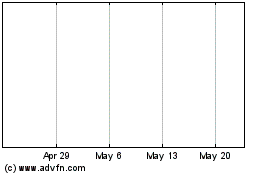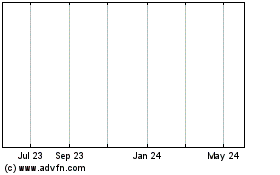Coca-Cola Pouring Cash Into Australia to Stem Sales Decline
February 21 2018 - 1:37AM
Dow Jones News
By Mike Cherney
SYDNEY--Coca-Cola Co. is pouring cash into an effort by its
Australian bottler to halt a decline in soft-drink sales in the
country, which remains a challenge for its global business despite
the high-profile launches of new products recently.
The Australian bottler, Coca-Cola Amatil Ltd., said Wednesday
that unit case volume fell 2.5% and revenue fell 3.3% in Australia
in 2017. In contrast, Coke, which owns a roughly 31% stake in
Amatil, said unit case volume was flat globally in 2017.
Coke Chief Executive James Quincey said on a conference call
last week that Australia is among the places to push smaller
package sizes as consumers move away from guzzling sugary
carbonated beverages and view them as a treat to drink sparingly.
In September, for example, Amatil started selling slim
250-milliliter cans of sugar-free flavored sparkling water under
its Mount Franklin brand.
Some companies view Australia as a good market to test new
products given its similarities with the U.S., and any products
that fall flat could indicate trouble ahead in other markets.
The decline in Australia comes even after the launch of Coke No
Sugar in the middle of last year, which is marketed as Coke Zero
Sugar in the U.S. One big grocery chain, Woolworths Group Ltd.,
initially refused to stock the new drink, saying customers already
had enough low-sugar options, though it is selling the drink now.
Amatil said its performance in the second half of the year was
better than the first and that there were "positive indicators"
from No Sugar and other new products.
Amatil plans to spend more than $30 million this year to
stabilize carbonated-beverage sales and grow sales in other
categories that are showing promise, like coffee and energy drinks.
The plan involves increasing the frequency of flavors which are
rotated, like the recently introduced raspberry and coffee
varieties, lowering prices to keep products like bottled water
competitive, and investments in digital technology.
On a conference call with analysts, Amatil Managing Director
Alison Watkins said it would be "fair to assume" that Coke plans to
spend a similar amount.
"We're both committed," Ms. Watkins said. "This is a joint plan
and the investment sitting behind it reflects that."
A spokesperson for Coca-Cola South Pacific, the drinks giant's
subsidiary in the region, said the company is contributing
"significant investment" on top of Amatil's amount. The
spokesperson said consumers in Australia and New Zealand will see
more innovative products hitting store shelves, with a focus on low
and no-sugar beverages.
Coke is looking to preserve soda sales in global markets. In the
U.S., it is betting that new Diet Coke flavors and redesigned cans
will cut losses and has relied on smaller cans to offset volume
declines.
Coke's market share in Australia is higher than it is in the
U.S., but it has been falling despite the efforts to retain
customers. Coke's Australia carbonated-beverage market share fell
from 55% in 2012 to about 50% in 2017, while in the U.S. it
actually grew from 36% to 37% in the same period, according to
market research firm Euromonitor International.
Overall sales volume of carbonated beverages in Australia are
down 10% over the same period, compared with 9% in the U.S.,
Euromonitor says.
Soda sales in Australia are "anticipated to remain negative as
consumer aversion to sugar consumption persists," Euromonitor
analyst Sara Agostino said.
Write to Mike Cherney at mike.cherney@wsj.com
(END) Dow Jones Newswires
February 21, 2018 02:22 ET (07:22 GMT)
Copyright (c) 2018 Dow Jones & Company, Inc.
Coca Cola Amatil (ASX:CCLCD)
Historical Stock Chart
From Jan 2025 to Feb 2025

Coca Cola Amatil (ASX:CCLCD)
Historical Stock Chart
From Feb 2024 to Feb 2025
